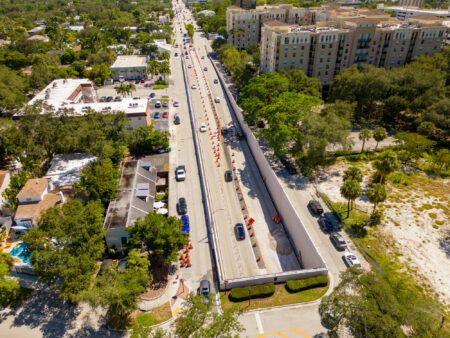Spanish transport technology and systems integrator Indra has implemented an innovative system for the Kuwait Municipality to integrate different technologies not only for monitoring traffic in real-time, but also for collecting, processing, analyzing and presenting the collected data graphically.
Indra has created a new traffic control center in Kuwait City that is equipped with its Horus smart traffic and tunnel management platform, which combines and integrates real-time information from over 200 permanent traffic sensors and 3,000 mobile sensors that the company has installed in different locations across the country. Through the use of GIS, an Indra-developed web-based platform displays all the traffic information collected and validated by the control center on an interactive map. This website is accessible to all citizens and can provide the country’s mobility agencies and other public entities with over 2,000 types of traffic report, which enables improved decision-making and optimized route planning.
The platform also benefits driver safety, since Kuwait emergency and law enforcement services can use the available information to respond to incidents in a more coordinated manner. Citizens can also access a website from their mobile devices where they can check the status of the traffic along the two main arteries into Kuwait City, and even view highly precise estimated travel times. In addition to improving the management and maintenance of the state’s current traffic and road network, analysis of the generated data will help Kuwait lay the foundations for planning future infrastructure developments and drafting new mobility laws and legislation.
The implementation of the new technologies will provide Kuwait with numerous benefits, including analysis of service levels on road networks, traffic flows at intersections and around transport hubs, while highlighting areas experiencing congestion issues, providing operators with valuable information to achieve optimum signal timings. Truck weighing systems will help monitor freight transport, providing greater insight regarding vehicle weights and their effects, primarily on roadbed wear and tear. These systems will provide authorities with the scheduling of maintenance and resurfacing, and the creation of domestic standards for pavement design.
The new wi-fi and Bluetooth sensors will allow Kuwait to conduct detailed studies on average speeds and travel times, while providing information on the best origin-destination routes. This project is the first part of an ambitious strategic plan drawn up by Kuwait that contemplates future phases to expand the current network of sensors or implement additional technologies, such as variable message signs (VMS), smart video-surveillance systems and other ITS equipment.




